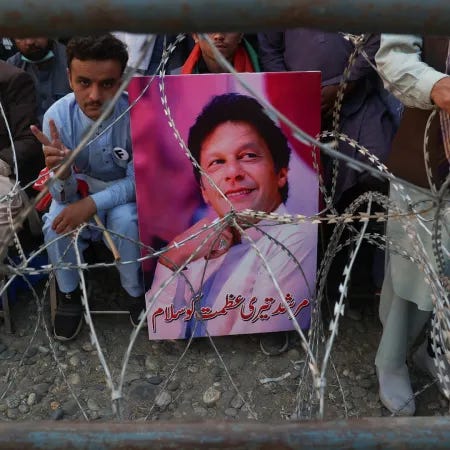Imran Khan and Wife Sentenced to Prison in Corruption Case Amid Ongoing Political Tensions
Islamabad, Pakistan – Imran Khan, Pakistan’s former Prime Minister, has been sentenced to 14 years in prison, while his wife, Bushra Bibi, received a seven-year sentence, in connection with a corrupti
Khan, who has been imprisoned since August 2023, was also fined 1 million Pakistani rupees ($3,500), while Bibi was fined half that amount. The court's decision follows months of delays and the repeated deferral of the verdict, which Khan has claimed were attempts to exert pressure on him. Bibi was arrested at the court on Friday, immediately following the announcement.
This ruling represents the fourth conviction of Khan, who has faced a series of legal challenges in recent years. Previous convictions related to the sale of state gifts, leaking state secrets, and an unlawful marriage were overturned or suspended, but Khan remains behind bars as numerous other cases against him are still pending. He has consistently described these proceedings as part of a politically motivated witch-hunt aimed at silencing him.
The case centers on the Al-Qadir Trust, which was established to promote educational and social welfare projects. Khan was arrested in May 2023, though he was released after just two days in custody. His arrest sparked nationwide protests and riots by his supporters.
Khan's lawyer, Faisal Fareed Chaudhry, has condemned the ruling, calling it an example of “bogus persecution.” Chaudhry argued that the National Accountability Bureau (NAB), which brought the charges against Khan and Bibi, failed to prove any financial loss to the state or establish any personal financial gain from the Trust’s activities.
The Pakistan Tehreek-e-Insaaf (PTI), Khan’s political party, has echoed these sentiments, claiming that the case lacks substance and that Khan and Bibi, as trustees, did not mismanage the Trust. The party argues that all evidence and witness testimonies show no wrongdoing, and the charges are politically motivated.
The NAB’s charge sheet accuses Khan and Bibi of acquiring land worth billions of rupees from Malik Riaz, a well-known property tycoon, to set up the educational institute. The NAB alleges that Khan, while in office from 2018 to 2022, facilitated a deal allowing Riaz to launder over $239 million. This, they claim, resulted in significant financial losses to the national treasury.
The case adds to a growing list of legal challenges for Khan, who was ousted from office in 2022 through a parliamentary vote of no confidence. He has since alleged that his removal was part of a conspiracy involving the military and the United States, allegations that both parties have denied. The military, which once supported Khan's rise to power, has since distanced itself from him amid growing political tensions.
The timing of the verdicts is significant, coming as negotiations between PTI and the government of Prime Minister Shehbaz Sharif continue. These talks, aimed at resolving the political deadlock between the two parties, now risk being derailed by the court’s decision.
Legal expert Hafiz Ahsaan Khokhar noted that the case has involved lengthy proceedings, with over 100 hearings in the past year. He explained that the key charges are money laundering and the misuse of public office, which have significant legal implications under Pakistan’s anti-corruption laws.
Political analyst Majid Nizami highlighted that the Al-Qadir Trust case stands out due to the comprehensive evidence presented during its investigation. However, Nizami also pointed to the broader political context, where the legal system has often been seen as a tool for political victimization rather than impartial justice. He warned that the conviction could strain the ongoing dialogue between PTI and the government, potentially leading to more aggressive political tactics by Khan’s party.
With the PTI facing internal divisions over how to respond, the verdict may prompt further unrest, especially as factions within the party push for more confrontational approaches. Nizami predicts that Khan’s supporters may intensify their calls for resistance rather than engagement, which could escalate the political crisis.
As tensions rise, the fate of Pakistan’s political landscape hangs in the balance, with Khan’s legal battles and the future of PTI continuing to shape the course of the nation’s political discourse.


